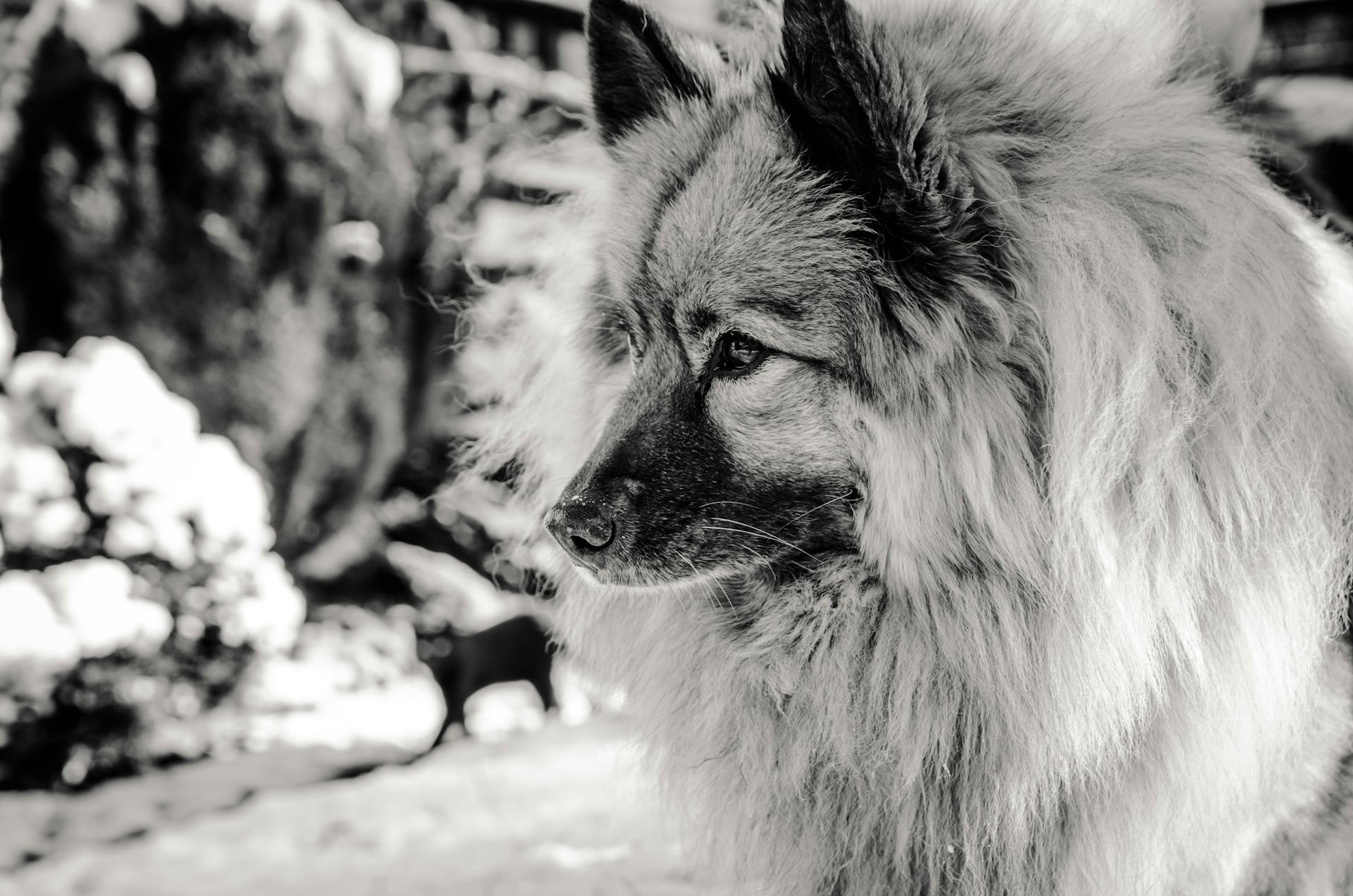
Morkie adults are a delightful combination of affectionate and playful personalities. They are known for being friendly and outgoing, making great companions for families and singles alike.
On average, Morkie adults weigh between 8 and 14 pounds and stand about 6-10 inches tall at the shoulder. Their small size makes them perfect for apartment living.
Morkie adults are intelligent and trainable, but they can be stubborn at times. Early socialization and training are crucial to develop good behavior and prevent unwanted habits.
Origin and History
The Morkie breed has a fascinating origin story. They're a relatively new designer breed that emerged in the late 1990s.
Breeders created Morkies to be low-shedding companions for apartment dwellers, aiming to combine the best qualities of their parent breeds. The Maltese, an ancient breed dating back over 2,000 years, is one of the Morkie's parent breeds.
The Yorkshire Terrier, on the other hand, has its roots in England during the Industrial Revolution. This mix of heritage and modern design has resulted in a friendly and affectionate small dog that's perfect for city living.
Temperament and Intelligence
Morkie adults are affectionate dogs that love to spend time with family members and often form strong bonds with them. They thrive on interaction and can get anxious if left alone for too long.
Their high intelligence makes them easy to train, even for beginners, and they're quick learners too. They're expert problem solvers that will keep you on your toes.
Morkie adults are eager to please and will constantly seek out your affection, so be prepared for plenty of snuggles and playtime.
Pet Care
Morkie adults are adaptable and easy to care for, but they do require some space to play and toys to mentally stimulate them. They are prone to separation anxiety, so it's essential to provide them with plenty of time with family members.
A minimum of 30 minutes of exercise per day is recommended, which can be achieved through short walks and playtime in a small yard. Playing fetch in a small yard is a great way to get them moving, and they can even enjoy a 10-15 minute walk twice a day.
See what others are reading: Pitbull Mix with Small Dog
To provide mental stimulation, you can use food dispensing toys when you're not home, and teaching tricks is a great way to keep them engaged. Here are some general tips for exercise and playtime:
- Playing fetch in a small yard
- A minimum of 30 minutes of exercise is recommended per day
- 10-15 minutes of walking twice per day
- Not jogging partners due to their size
Owning a Pet
Owning a pet can be a wonderful experience, but it's essential to consider the needs and personalities of the animals involved.
Morkies are generally good companions for other pets, especially if they're socialized from an early age. They'll often encourage their feline and canine friends to play.
However, their strong prey drive can be a problem, especially when it comes to smaller animals like mice. It's crucial to supervise interactions between Morkies and smaller pets to prevent any harm.
Their small size can also make them vulnerable to injury when playing with larger dogs, so it's vital to keep a close eye on them during playtime.
A different take: When Does a Morkie Stop Growing
Standard Information
Morkies are a crossbreed, not a pure breed, so there's no well-established breed standard information for them.
Their appearance can vary greatly, but they often have small and dark eyes that give them an inquisitive look.
Morkies can be white, golden, brown, or black, depending on the color of their Yorkshire parent.
They can have either floppy or pointed ears, depending on which parent they take after.
Their distinguishing features include being toy-sized, having long and silky hair, and having a round teddy bear-like face.
These adorable dogs are fun to look at and cuddle with!
Health and Nutrition
Feeding your Morkie a high-quality, nutritionally complete and balanced adult dog food is essential for its overall health and well-being.
Morkies are prone to weight gain if they're fed too much and not kept on a regular eating schedule, so it's best to feed them meals rather than leaving food out throughout the day.
Limit the number of treats you give your Morkie to keep its weight under control, as treats should make up no more than 10% of their total daily calories.
Pet Insurance for

Pet insurance is a great idea for pet parents of Morkies, as it covers them from head to toe in case of illness, emergency, or genetic condition.
Healthy Paws' dog insurance plans cover Morkies for chronic conditions, cancer, x-rays, blood tests, hospitalizations, alternative treatments, prescription medications, and more.
Morkies can be covered by Healthy Paws' plans for all of these things, except for pre-existing conditions or as otherwise excluded from your policy.
This is a great way to ensure that your Morkie is getting the very best care possible without financial concerns holding you back from seeking treatment when needed.
Get your free Morkie pet insurance quote today or give Healthy Paws a call at 855-898-8991 with any questions you may have.
For another approach, see: Great Pyrenees Adult
Common Health Problems
Morkies are prone to a range of health issues due to their unique genetic makeup. As a responsible pet owner, it's essential to be aware of these potential problems.
Luxating patella, a type of knee problem, is one of the most common health issues in Morkies. This can be a painful and debilitating condition for your dog.
Dental problems are also a concern for Morkies. Regular brushing and veterinary check-ups can help prevent these issues.
Collapsing trachea is another potential health problem in Morkies. This can be caused by excessive coughing or playing.
Hernias are a common issue in Morkies, and can be caused by a combination of factors including genetics and injury.
Heart disease is a serious health issue that can affect Morkies. Regular veterinary check-ups and a healthy lifestyle can help prevent this.
Glaucoma is a painful and potentially blinding condition that can affect Morkies. Regular veterinary check-ups can help detect this issue early on.
Reverse sneezing is a common condition in Morkies, but can be distressing for owners. If your dog is experiencing frequent or severe reverse sneezing, it's essential to consult with a veterinarian.
Here are some of the most common health issues in Morkies:
- Luxating patella
- Portosystemic shunt
- Dental problems
- Collapsing trachea
- Hernias
- Heart disease
- Glaucoma
- Reverse sneezing
- Hypoglycemia
Diet and Nutrition
Feeding your Morkie regularly scheduled meals is crucial to prevent weight gain. Leave food out throughout the day, as this can lead to overeating.
Morkies thrive on high-quality, nutritionally complete, and balanced adult dog food. Puppies, on the other hand, need puppy food until they're around 9 to 10 months old.
To keep your Morkie slim, you should be able to see its waist and feel its ribs without having to press too hard.
You should divide the total amount of food for the day into at least two meals for adults and three to four meals for puppies. Place the food out in a bowl at approximately the same time each day.
Talk to your veterinarian if you have any questions about your Morkie's diet or health. Your veterinarian is a great resource for guidance on what food to use and how much to feed your Morkie.
Your Morkie will require high-quality dog food that has real meat like chicken or turkey listed as the first ingredient. Limit treats to no more than 10% of their total daily calories.
Follow the portioning recommendations on the package carefully, as it's easy for a small dog like a Morkie to put on weight.
For more insights, see: Are Shih Tzus High Maintenance
They're Technically Hypoallergenic
Morkies are a great choice for people with allergies because they don't shed much.
Their low shedding is due to the fact that they inherit this trait from their parent breeds, which are also considered hypoallergenic.
Grooming and Maintenance
To keep your Morkie adult looking their best, regular brushing is a must, as they don't shed much and can develop knots and tangles if neglected.
You'll want to brush their fur every few days to keep it looking neat and prevent tangles. A high-quality dog-specific shampoo is also essential for keeping their fur shiny and odor-free.
Clipping their nails is crucial when you hear them clicking on the floor, as indoor dogs don't wear them down enough and overgrowth can lead to discomfort and injury.
Grooming
Brushing your dog's fur regularly is a must, even if they don't shed much, to keep it looking neat and prevent knots and tangles.
You'll need to brush their fur frequently to keep it in good condition. A bath every several weeks with a high-quality dog-specific shampoo will also help keep their fur shiny and odor-free.
Clipping their nails is essential when you hear them clicking on the floor, as indoor dogs don't wear them down enough and overgrowth can lead to discomfort and injury.
Regularly checking their ears for signs of wax buildup or infection and keeping them clean and dry is crucial for their overall health.
Brushing their teeth as frequently as possible with dog-specific toothpaste will help guard against dental disease and keep their mouth healthy.
Color-Changing Coat
The Morkie's color-changing coat is a unique feature that's sure to turn heads.
Morkies inherit these color-changing coat genes from their Yorkshire Terrier side.
Their coat often starts as a black and tan combination that lightens as they age.
This is a normal process and not a sign of any health issues.
As they mature, their coat may become more silver, gold, or cream in color.
This color change is a result of the natural shedding process, which can be a bit messy at times.
See what others are reading: Dog Blowing Coat in Winter
Size and Characteristics
Morkies are small dogs that usually weigh just five to seven pounds when fully grown. They typically reach their adult height by the age of nine months and get to be seven to nine inches tall. It takes a couple more months for them to fill out completely.
Morkies have a fairly calm temperament but tend to bark frequently at people or sounds that are unfamiliar. They have big personalities and love running around during playtime.
Here's a breakdown of what you can expect from your Morkie's size and characteristics as they grow older:
Characteristics of
Morkies have a calm temperament, but they tend to bark frequently at unfamiliar people or sounds. This is a characteristic they inherit from their Yorkshire terrier side.
Morkies are athletic dogs with big personalities, and they love running around during playtime. They're bred to be companions, so they're very loyal and affectionate.
Morkies often pick a favorite person and become very attached to that one person. Don't get offended, it's just their nature!

Here's a breakdown of Morkie characteristics:
Morkies have a high energy level, which means they need regular exercise to stay happy and healthy. They're not high-maintenance dogs, but they do require some attention and activity.
Curious to learn more? Check out: Activities for Dogs with High Prey Drive
History and Facts
The Morkie breed has a relatively short history, with its origins dating back to the late 1990s.
The Maltese parent of the Morkie is an ancient breed, with a history dating back more than 2,000 years.
Morkies are a designer breed, created to be companion dogs with a vibrant personality and a low-shedding coat.
The Yorkshire Terrier, the other parent breed, got its start in England during the Industrial Revolution.
Morkies are a relatively recent creation, only becoming popular within the past decade.
Demand for Morkies has been increasing in recent years, making them a popular choice for many dog owners.
Final Thoughts and Tips
The Morkie is a wonderful dog, small enough to fit in almost any apartment and friendly enough to get along with nearly anyone.
They form strong bonds with family members and are surprisingly protective, which can put them in danger if they are up against a larger dog.
However, they usually get along with their fellow household pets and often instigate them into playing games.
The Morkie is an intelligent breed that is easy even for beginners to train, making them a good choice for any home.
As a small but fierce breed, it's essential to socialize your Morkie well to prevent any potential conflicts with larger dogs.
Their intelligence and trainability make them a joy to work with, and with positive reinforcement, they can learn to behave well in various situations.
Frequently Asked Questions
Do morkies bark a lot?
Yes, Morkies are known to be yappy dogs and tend to bark a lot. Their enthusiastic barking can be a consideration for apartment living and neighbor relations.
What's the average lifespan of a Morkie?
A Morkie's average lifespan is 11-15 years, making them a long-lived small dog breed. With proper care, they can enjoy a happy and healthy life for over a decade.
Featured Images: pexels.com


